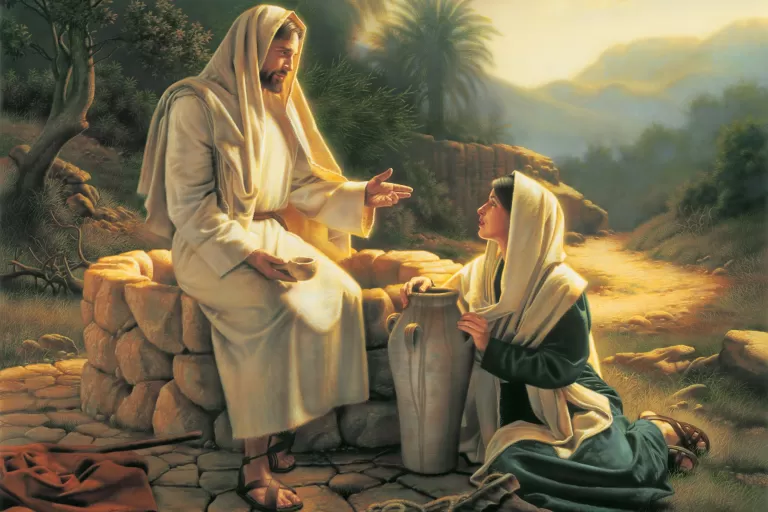
Early in the Savior’s ministry, He took occasion to travel from Judea to Galilee by way of Samaria. Now, most Jews at that time considered a Samaritan the lowest class of human being on the earth, and they would not associate with them, not even travel through their land. But Jesus, pressed by a need unknown to us, journeyed on the forbidden soil.
Now, around noon, Jesus and the twelve stop near Jacob’s well in the land of the Samaritans. It’s hot and Jesus is tired. As the disciples go away to buy food, Jesus rests on the edge of the well. A woman approaches the well carrying a water pot.
Jesus says to her, “… Give me to drink.” (John 4:7)
Recognizing that He’s a Jew, the woman is shocked that He has broken custom, and even spoken to her.
“… How is it,” she inquires, “that thou, being a Jew askest drink of me, who [which] am a woman of Samaria? …” (John 4:9)
Now, it seems right here that Jesus sets aside His thirst momentarily, and focuses on the woman, and the teaching opportunity afforded Him. He replies, “… If thou knewest the gift of God, and who it is that saith to thee, Give me to drink; thou wouldest have asked of him, and he would have given thee living water.” (John 4:10)
Well, the woman doesn’t understand. She’s thinking literally about water and water pots, etc., but the Master is speaking figuratively. So, patiently and gently, Jesus leads her to a point of spiritual readiness where she ‘is now’ prepared to be taught the Gospel.
Then abruptly, Jesus says to her, “… Go, call thy husband, and come hither.” (John 4:16)
The woman replies in shamed truth, “… I have no husband. …” (John 4:17)
And now perhaps we see why she is coming to draw water in the heat of the day when there’s no other person at the well, because Jesus says, “… Thou hast well said, I have no husband: For thou hast had five husbands; and he whom thou now hast is not they husband: in that saidst thou truly.” (John 4:17-18)
I love this part of the story. This woman was grossly unworthy. Her life has been one of poor choices and many mistakes, yet does the Master turn away? – Does He deny her or deem her unworthy of His help? No! In fact, in bold and undeniable terms, He declares to her, in one of those rare instances that He did so, that He is the Promised Messiah.
So impressed and converted is this woman, that because of her, many Samaritan souls come out to hear Jesus, and they too are converted.
Now, I conclude from this story that I don’t need to reach a certain level of worthiness to receive help from my Savior. That’s why He’s the Savior – because He can save me – anytime, anywhere, and in any pitiful condition I’m in – if I’m willing to be helped. If you stop and think about what we want to be and where we want to be, and what we are now at the present time, none of us are [is] worthy, none of us, and never will be without Him – but He still loves us.
One last thing: If your efforts to live your religion take all the joy and fun out of life, you’re not doing it right.
Story Credits
Adapted from John 4.
Glenn Rawson – February 1998
Music: He Is Risen, track 3 – Lex de Azevedo
Song: Women at the Well – Julie de Azevedo
Painting: Living Water (Jesus and the Samaritan Woman), by Simon Dewey
